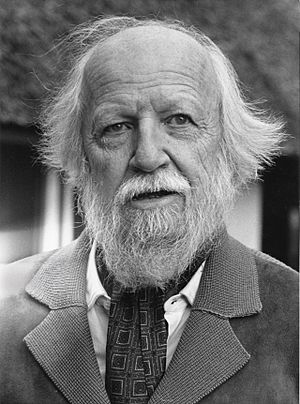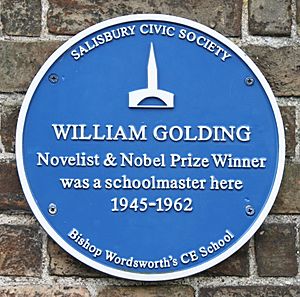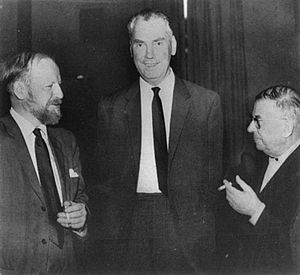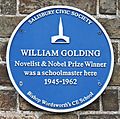William Golding facts for kids
Quick facts for kids
Sir
William Golding
CBE FRSL
|
|
|---|---|

Golding in October 1983
|
|
| Born | William Gerald Golding 19 September 1911 Newquay, Cornwall, England |
| Died | 19 June 1993 (aged 81) Perranarworthal, Cornwall, England |
| Occupation | Schoolteacher • Novelist • Playwright • Poet |
| Alma mater | Brasenose College, Oxford |
| Genre | Survivalist fiction • Robinsonade • Adventure • Sea story • Science fiction • Essay • Historical fiction • Stageplay • Poetry |
| Notable works | Lord of the Flies, Rites of Passage |
| Notable awards | 1983 Nobel Prize in Literature 1980 Booker Prize |
| Signature | |
Sir William Gerald Golding (born September 19, 1911 – died June 19, 1993) was a famous British writer. He wrote novels, plays, and poems. He is best known for his first novel, Lord of the Flies, which came out in 1954.
Golding wrote twelve more novels during his life. In 1980, he won the Booker Prize for his book Rites of Passage. This book was the first in a series of three sea adventure novels called To the Ends of the Earth. In 1983, he received the Nobel Prize in Literature, which is a very important award for writers.
Because of his great work in literature, Golding was made a knight in 1988. This means he was given the title "Sir." In 2008, The Times newspaper listed him as one of the top British writers since 1945.
Contents
William Golding's Life Story
Growing Up and Education

William Golding was born in Newquay, Cornwall, England. His family's house there was called Karenza, which means love in the Cornish language. He spent many childhood holidays at this house.
He grew up in Marlborough, Wiltshire. His father, Alec Golding, was a science teacher at Marlborough Grammar School. William and his older brother, Joseph, went to this school. His mother, Mildred, was a strong supporter of women's rights. She was Cornish and told him many old Cornish ghost stories.
In 1930, Golding went to Brasenose College, Oxford. He first studied science for two years. Then, he switched to English for his last two years of study. He earned his degree in 1934. Later that year, a book of his Poems was published.
Teaching Career
In 1935, Golding started teaching English at Michael Hall School in South London. He taught there for two years. After more study, he taught English and music at Maidstone Grammar School from 1938 to 1940.
In April 1940, he moved to Bishop Wordsworth's School in Salisbury. He taught English, Philosophy, Greek, and drama there. He left teaching for a time to join the navy in December 1940. After the war, he returned to Bishop Wordsworth's School in 1945. He taught the same subjects until 1961.
Golding kept a personal diary for over 22 years. It contained about 2.4 million words. He used it to write down his dreams and later, to record his life. The diary showed his thoughts about his novels and memories from his past. For example, he wrote about setting up his students into two groups to fight. This experience helped him write Lord of the Flies.
Family Life
William Golding married Ann Brookfield, a chemist, on September 30, 1939. They had two children. Their son, David, was born in September 1940. Their daughter, Judith, was born in July 1945.
Serving in World War II
During World War II, Golding joined the Royal Navy in 1940. He served on a destroyer ship. This ship was involved in chasing and sinking the German battleship Bismarck.
Golding also took part in the D-Day invasion of Normandy. He commanded a landing craft that fired rockets onto the beaches. He was also involved in fighting at Walcheren in October and November 1944. During this time, many assault crafts were sunk.
Later Life and Death
In 1985, Golding and his wife moved to a house in Cornwall called Tullimaar. He died eight years later, on June 19, 1993, from heart failure. He was buried in the churchyard of Bowerchalke.
When he died, he left behind a draft of a novel called The Double Tongue. This book was set in ancient Delphi and was published after his death in 1995.
William Golding's Writing Career
Becoming a Successful Writer
While still teaching at Bishop Wordsworth's School, Golding started writing a novel in 1951. It was first called Strangers from Within.
In 1953, after many publishers said no, Golding sent his book to Faber and Faber. An editor there, Charles Monteith, liked it and asked for some changes. The novel was published in September 1954 as Lord of the Flies.
In 1958, Golding moved to Bowerchalke. There, he met his neighbor James Lovelock. They talked about Lovelock's idea that Earth's living things act like one big organism. Golding suggested calling this idea the Gaia hypothesis, after the Greek goddess of the Earth.
His success as a writer allowed Golding to quit his teaching job in 1961. He spent that year in the United States as a writer-in-residence at Hollins College.
Golding won the James Tait Black Memorial Prize for Darkness Visible in 1979. He won the Booker Prize for Rites of Passage in 1980. In 1983, he received the Nobel Prize for Literature. This award was a surprise to many.
In 1988, Golding was made a Knight Bachelor. A few months after his death in 1993, the first international conference about William Golding was held in France.
His Novels
- Lord of the Flies (1954): This was his first novel. It tells the story of a group of boys stuck on a tropical island. They become wild and lawless before being rescued. This book was also made into movies and a play.
- The Inheritors (1955): This book is about a group of gentle Neanderthals who meet modern humans. The modern humans are shown as tricky and violent.
- Pincher Martin (1956): This novel shares the thoughts of a sailor who is drowning.
- Free Fall (1959): This story looks at the idea of having free choice. The main character, a soldier in a German prison camp during World War II, thinks back on his choices. He tries to figure out when he lost his freedom to decide things for himself.
- The Spire (1964): This book is about building a very tall spire on a medieval cathedral. The spire is so big it almost causes the cathedral to fall down. Many believe the cathedral in the story is based on Salisbury Cathedral.
- The Pyramid (1967): This book has three connected stories. They all take place in a small English town, partly based on Marlborough, where Golding grew up.
- The Scorpion God (1971): This collection has three shorter novels. One is set in ancient Egypt, another describes a prehistoric hunter-gatherer group, and the third is in the court of a Roman emperor. The Roman emperor story was later turned into a play called The Brass Butterfly.
- Darkness Visible (1979): This story involves terrorism and a mysterious person who survives a fire during World War II. This person seems to have special powers.
- To the Ends of the Earth (trilogy): This is a series of three novels about a sea journey to Australia in the early 1800s.
- Rites of Passage (1980): This was the first book in the series and won the Booker Prize.
- Close Quarters (1987)
- Fire Down Below (1989)
- The Paper Men (1984): This book tells about the struggles between a novelist and someone trying to write his biography.
List of William Golding's Works
Poetry
- Poems (1934)
Drama
- The Brass Butterfly (1958)
Novels
- Lord of the Flies (1954)
- The Inheritors (1955)
- Pincher Martin (1956)
- Free Fall (1959)
- The Spire (1964)
- The Pyramid (1967)
- Darkness Visible (1979) (James Tait Black Memorial Prize)
- To the Ends of the Earth (trilogy)
- Rites of Passage (1980) (Booker Prize)
- Close Quarters (1987)
- Fire Down Below (1989)
- The Paper Men (1984)
- The Double Tongue (published after his death in 1995)
Collections of Stories
- The Scorpion God (1971)
- "The Scorpion God"
- "Clonk Clonk"
- "Envoy Extraordinary"
Non-fiction (True Stories and Essays)
- The Hot Gates (1965)
- A Moving Target (1982)
- An Egyptian Journal (1985)
Audiobooks
- 2005: Lord of the Flies (read by the author), Listening Library, ISBN: 978-0-307-28170-8
Images for kids
See also
 In Spanish: William Golding para niños
In Spanish: William Golding para niños
 | Janet Taylor Pickett |
 | Synthia Saint James |
 | Howardena Pindell |
 | Faith Ringgold |





